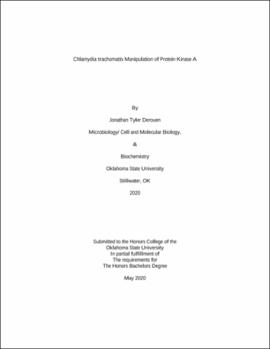| dc.contributor.author | Derouen, Jonathan Tyler | |
| dc.date.accessioned | 2021-04-20T13:53:19Z | |
| dc.date.available | 2021-04-20T13:53:19Z | |
| dc.date.issued | 2020-05-08 | |
| dc.identifier | oksd_derouen_HT_2020 | |
| dc.identifier.uri | https://hdl.handle.net/11244/329420 | |
| dc.description.abstract | The most commonly reported bacterial sexually transmitted infection in the United States is Chlamydia trachomatis which can lead to pelvic inflammatory disease, tubal infertility and even increased risk of cervical cancer. C. trachomatis can only survive inside of the cell and lives in a parasitophorous vacuole. During infection, manipulation of different protein kinases aid in its replication and survival processes. One such enzyme is Protein Kinase A, PKA, which is an essential kinase in the host cell that phosphorylates other proteins for activation. Misregulation of PKA signaling has been identified in the development of many cancers. Not much is known about the intracellular Chlamydial manipulation of host cellular kinases, such as PKA during the infection process. The goal of this study was to determine the extent to which C. trachomatis manipulates PKA during the infection process. We hypothesize that C. trachomatis actively manipulates PKA signaling to regulate intracellular development and survival inside the host. We utilized western blot analysis of whole cell lysates (HeLa cells infected with C. trachomatis) collected at various time points to monitor phosphorylation changes of PKA kinases and substrates. Protein samples collected at various times of the infection process were separated by SDS-PAGE and transferred to nitrocellulose membranes. These membranes were probed by various phosphospecific antibodies to specific host PKA kinases, specific kinase substrates and total PKA substrates. The use of horse-radish peroxidase conjugated secondary antibodies allowed for visualization via the use of chemiluminescence. The results obtained confirmed that PKA and PKA substrates were indeed manipulated by C. trachomatis during infection and specifically that PKA activity was upregulated in the latter times of infection. These findings conclude that PKA enzymes serve an important role for the intracellular growth and development of C. trachomatis. Additional studies will help to determine if expression of specific PKA substrates is altered during C. trachomatis infection and if misregulation of these specific substrates is linked with cancer development. This can have a significant impact on human health and may identify certain factors that increase the risk of cervical cancer after C. trachomatis infection. | |
| dc.format | application/pdf | |
| dc.language | en_US | |
| dc.rights | Copyright is held by the author who has granted the Oklahoma State University Library the non-exclusive right to share this material in its institutional repository. Contact Digital Library Services at lib-dls@okstate.edu or 405-744-9161 for the permission policy on the use, reproduction or distribution of this material. | |
| dc.title | Chlamydia trachomatis manipulation of Protein Kinase A | |
| osu.filename | oksd_derouen_HT_2020.pdf | |
| osu.accesstype | Open Access | |
| dc.type.genre | Honors Thesis | |
| dc.type.material | Text | |
| dc.contributor.director | Lutter, Erika | |
| dc.contributor.facultyreader | DeSilva, Udaya | |
| thesis.degree.discipline | Microbiology and Molecular Genetics | |
| thesis.degree.grantor | Oklahoma State University | |
